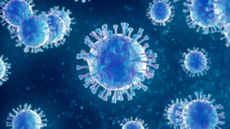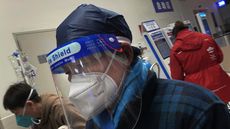How long are you contagious with Covid and how long do symptoms last?
New evidence estimates that 1.3 million people across the UK were infected with the virus in the week up to 5 December

Approaching Christmas, the UK’s Covid cases are once again on the rise.
Data in October had suggested Britons could face a relatively low Covid Christmas, but new evidence from the Office for National Statistics (ONS) estimates that 1.3 million people across the UK were infected with the virus in the week up to 5 December, up from 1.1 million the week before.
A “relatively new variant, BQ.1.1…is behind at least some of the recent surge”, said the director of the Centre for Mathematical Biology at the University of Bath, Kit Yates, in The Guardian. The increasing infections, potentially from increased mixing indoors, could leave “people facing another Christmas away from family”, said ITV News.
Subscribe to The Week
Escape your echo chamber. Get the facts behind the news, plus analysis from multiple perspectives.

Sign up for The Week's Free Newsletters
From our morning news briefing to a weekly Good News Newsletter, get the best of The Week delivered directly to your inbox.
From our morning news briefing to a weekly Good News Newsletter, get the best of The Week delivered directly to your inbox.
However, the new surge of infections still leaves the UK “looking better than this time last year” wrote Yates, when the emerging Omicron variant caused widespread disruption to people’s Christmas plans.
Despite “more freedoms” this year compared to previous Covid Christmases, as “small-scale outbreaks” become more endemic, explained Adam Kleczkowski at The Conversation, “individual people and societies will be feeling the effects of the Covid pandemic for many months, if not years, to come”.
How long are you contagious?
A lot of people with Covid will “no longer be infectious to others after five days”, according to the official government guidance, but “some people may be infectious to other people for up to 10 days from the start of their infection.”
Contagion levels vary between the different strains of the virus. While Omicron may be milder than earlier Alpha or Delta strains, its “subvariants are considered to be especially efficient spreaders of the disease”, said Yale School of Medicine, and so isolating for a longer period will reduce the risk of transmission.
Sign up for Today's Best Articles in your inbox
A free daily email with the biggest news stories of the day – and the best features from TheWeek.com
According to the ONS, most Covid-19 infections in the UK since June have been Omicron variants BA.4 or BA.5.
How long do Covid symptoms last?
There are a variety of symptoms Covid-infected people could suffer from, including a sore throat, a cough, a runny nose, fatigue, headaches, loss of taste or smell, and nausea, among others.
A sore throat is still the “commonest symptom” affecting around “64% of cases”, Professor Tim Spector, co-founder of the ZOE Health Study, told the Manchester Evening News.
According to the ZOE Health Study, most people will recover from Covid and its symptoms “within two weeks”. However, one in ten will continue to suffer for three weeks, while others “may suffer for months”, the study said.
The longest-lasting symptom, lasting potentially “three months or longer”, is fatigue, infectious disease specialist Dr Ramprasad Gopalan, told Women’s Health. This differs from long Covid, where people “typically experience two or more symptoms”. According to ONS data in July 2022, around 3% of the UK population was suffering from long Covid.
Do you still have to isolate if you test positive for Covid?
Self-isolation is no longer a legal requirement, but the government advises those who have tested positive to “try to stay at home and avoid contact with other people”.
Anyone with coronavirus should avoid meeting people “at higher risk of becoming seriously unwell if they are infected with Covid-19 and other respiratory infections”, including people who are immunocompromised, “for ten days after the day you took your test”, it says.
Professor Karl Friston, of University College London (UCL) suggested that “the lower-than-expected peak” last month “could be the result of reduced mixing”, said i news’s science and environment correspondent, Tom Bawden.
The UCL professor calculated that people have been socialising at 82% of pre-pandemic levels, noting that there seems to have been “enduring changes in our collective behaviour that ‘dampen’ large fluctuations in prevalence”.
Of the latest modelling, he told Sky News that “the week after Christmas”, when people socialise “indoors with the windows closed” and travel “to see people you haven’t seen in months”, is when “contact rates are really up”.
Is Covid getting less severe?
“The short answer is no,” said the British Medical Journal. Steve Griffin, associate professor at the University of Leeds, told the journal that “because of its massive prevalence”, the clinical impact of Covid “is still very, very marked”.
Covid can also cause complications with other infections or diseases. David Strain, senior clinical lecturer at the University of Exeter Medical School, noted in August that “it doesn’t matter what those other diseases are”. Strain referred to having seen patients with Crohn’s, coeliac and arthritis presenting with “exacerbations” after having Covid.
Long Covid could be “the real worry”, the journal noted. Of the 2.3m people who have reported that they are suffering with long Covid, 72% said that the symptoms had adversely impacted their daily activities, the ONS reported in October.
Create an account with the same email registered to your subscription to unlock access.
Richard Windsor is a freelance writer for The Week Digital. He began his journalism career writing about politics and sport while studying at the University of Southampton. He then worked across various football publications before specialising in cycling for almost nine years, covering major races including the Tour de France and interviewing some of the sport’s top riders. He led Cycling Weekly’s digital platforms as editor for seven of those years, helping to transform the publication into the UK’s largest cycling website. He now works as a freelance writer, editor and consultant.
-
 Pig kidney transplant recipient dies
Pig kidney transplant recipient diesSpeed Read Richard Slayman has passed away two months after undergoing the historic procedure
By Peter Weber, The Week US Published
-
 Putin replaces defense minister with economist
Putin replaces defense minister with economistSpeed Read In a surprising shake-up, Putin replaced Sergei Shoigu with civilian economist Andrei Belousov
By Peter Weber, The Week US Published
-
 Today's political cartoons - May 13, 2024
Today's political cartoons - May 13, 2024Cartoons Monday's cartoons - a portrait of humanity, cool re-brand, and more
By The Week US Published
-
 Covid four years on: have we got over the pandemic?
Covid four years on: have we got over the pandemic?Today's Big Question Brits suffering from both lockdown nostalgia and collective trauma that refuses to go away
By Chas Newkey-Burden, The Week UK Published
-
 The hollow classroom
The hollow classroomOpinion Remote school let kids down. It will take much more than extra tutoring for kids to recover.
By Mark Gimein Published
-
 Excess screen time is making children only see what is in front of them
Excess screen time is making children only see what is in front of themUnder the radar The future is looking blurry. And very nearsighted.
By Devika Rao, The Week US Published
-
 Covid-19: what to know about UK's new Juno and Pirola variants
Covid-19: what to know about UK's new Juno and Pirola variantsin depth Rapidly spreading new JN.1 strain is 'yet another reminder that the pandemic is far from over'
By Arion McNicoll, The Week UK Published
-
 Long-term respiratory illness is here to stay
Long-term respiratory illness is here to stayThe Explainer Covid is not the only disease with a long version
By Devika Rao, The Week US Published
-
 Covid inquiry: the most important questions for Boris Johnson
Covid inquiry: the most important questions for Boris JohnsonTalking Point Former PM has faced weeks of heavy criticism from former colleagues at the public hearing
By The Week Staff Published
-
 China's pneumonia cases: should we be worried?
China's pneumonia cases: should we be worried?The Explainer Experts warn against pushing 'pandemic panic button' following outbreak of respiratory illness
By Keumars Afifi-Sabet, The Week UK Published
-
 Vallance diaries: Boris Johnson 'bamboozled' by Covid science
Vallance diaries: Boris Johnson 'bamboozled' by Covid scienceSpeed Read Then PM struggled to get his head around key terms and stats, chief scientific advisor claims
By The Week UK Published